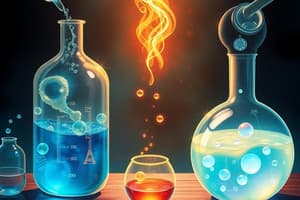Podcast
Questions and Answers
What is an independent variable?
What is an independent variable?
- A testable prediction.
- A systematic approach used in scientific study.
- The factor that is manipulated or controlled by the experimenter. (correct)
- The experimental factor that is being measured.
What is a dependent variable?
What is a dependent variable?
The experimental factor that is being measured.
What is the scientific method?
What is the scientific method?
A systematic approach used in scientific study that typically includes observation, a hypothesis, experiments, data analysis, and a conclusion.
What is a hypothesis?
What is a hypothesis?
What is an experiment?
What is an experiment?
What is a variable?
What is a variable?
What is a control in an experiment?
What is a control in an experiment?
What is a model?
What is a model?
What is a scientific theory?
What is a scientific theory?
What is a scientific law?
What is a scientific law?
What is precision in measurements?
What is precision in measurements?
What is accuracy in measurements?
What is accuracy in measurements?
Study Notes
Key Concepts in Science
-
Independent Variable: The element that the experimenter changes deliberately in a study to observe its effects.
-
Dependent Variable: The factor that is measured in an experiment, which may change due to alterations in the independent variable.
-
Scientific Method: A structured process for scientific inquiry involving observation, hypothesis formulation, experimentation, data analysis, and concluding results.
-
Hypothesis: A specific and testable prediction generated from a question or observation about the relationship between variables.
-
Experiment: A research procedure where one variable is manipulated to determine its effect on another, allowing scientists to establish cause-and-effect relationships.
-
Variable: Any factor that can be changed or controlled within an experiment; can be independent, dependent, or controlled.
-
Control: A baseline condition in experimental design against which the results of other conditions are compared, ensuring reliability and validity.
-
Model: A simplified representation or conceptual framework of a phenomenon that aids in understanding complex concepts or processes.
-
Scientific Theory: A well-substantiated explanation of a phenomenon, built upon a body of evidence from observations and experiments.
-
Scientific Law: A concise statement that describes a consistent and universal relationship observed in nature, often expressed mathematically.
-
Precision: Refers to the consistency of repeated measurements; high precision indicates minimal variation among repeated measurements.
-
Accuracy: Indicates how close a measured value is to the actual or accepted standard; high accuracy signifies measurements are near the true value.
Studying That Suits You
Use AI to generate personalized quizzes and flashcards to suit your learning preferences.
Description
Test your knowledge of key concepts in science with these flashcards focused on Chapter 1: The Nature of Science. Learn about independent and dependent variables, as well as the scientific method. Perfect for students looking to reinforce their understanding of foundational scientific principles.




